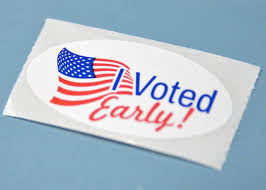Oklahoma bucks red-state trend; extends early voting
Mike Seals - May 16, 2021 11:08 pm

By SEAN MURPHY and NICHOLAS RICCARDI
OKLAHOMA CITY (AP) — On Election Day last year, state Rep. Jon Echols was mortified to see a 3 1/2-hour line to vote in his district, which stretches from the edge of Oklahoma City’s urban core into suburban neighborhoods that give way to wide stretches of rural land.
A nation like the U.S. — with “real, free and fair elections,” Echols said — shouldn’t make people wait so long to participate in democracy.
“We should all be humiliated that we had that,” Echols said.
He may sound like a voting rights advocate or a Democratic politician set on expanding access to the ballot, but Echols is a Republican and the majority floor leader of the GOP-controlled Oklahoma House. What he did after that Election Day revelation stands in sharp contrast to what the GOP has done in many other states — Echols helped make it slightly easier to vote in deep-red Oklahoma.
Gov. Kevin Stitt, a Republican, signed legislation this week that adds a day to in-person early voting in the state and an extra hour to Saturday early voting, and it also makes changes to ensure mail-in ballots are received in time to be counted. The move comes as voting has become a top issue among Republicans — but in the other direction. GOP-controlled states from Arkansas to Florida have passed laws making it harder to vote, ranging from adding scrutiny to signatures on mail ballots to limiting the time frame drop boxes can be used, and all inspired by former President Donald Trump’s false insistence that he lost his reelection bid because of fraud.
Oklahoma’s entire delegation in the U.S. House — all Republicans — heeded Trump’s call about fake election fraud and voted against certifying the Electoral College votes on Jan. 6, and two dozen Republican state lawmakers urged them in a letter to do so. But the bill to expand early voting sailed through the House and Senate with just a handful of opposing votes.
Chad Alexander, a GOP strategist and former chair of the Oklahoma Republican Party, said he thinks part of the reason the measure faced little opposition is that one extra day of early voting isn’t likely to slow the Republican dominance in the deep-red state.
“We haven’t had a Democrat carry a single county in a presidential race in five election cycles,” Alexander said. “Every statewide elected official is a Republican, and they were elected in an off-year for Republicans.
“Oklahoma is very red, and I don’t think this change disproportionately affects either party,” he said.
That contrasts with other states where Republicans have pushed to change voter laws: political battlegrounds like Florida; states where the GOP fears its hold is slipping, like Arizona and Georgia; or even places where the party is on the upswing but still threatened by occasional wins on the other side of the aisle, like Montana. In several of these states, the changes disproportionately hamper Democratic voters, like college students in Montana, who can no longer use campus IDs as valid voting identification.
Oklahoma has long stood out as a place with restrictive voting laws.
Even with an extra day for Oklahomans to cast in-person, absentee ballots, Oklahoma’s 4 1/2 days of early voting are among the fewest in the nation. According to the National Conference of State Legislatures, early voting periods across the country range from four days to 45 days, with the average length being 19 days.
Oklahoma Election Board Secretary Paul Ziriax said the additional day will provide a convenience to voters, but he’s skeptical that it will have a dramatic effect on turnout in Oklahoma.
“Generally, I think if you look around the country at states with higher turnout, I personally think it has a lot less to do with things like the number of early voting days that states have available and has a lot more to do with the amount of money political parties and candidates are spending on get-out-the-vote programs,” Ziriax said.
Pat McFerron, a Republican pollster and strategist, said adding an early day of voting will likely also fend off criticism about Oklahoma’s laws, which include a voter ID requirement and notarized mail-in ballots.
“I would actually say the Republican partisans I’ve spoken to are not enamored with this move,” McFerron said, “especially when you consider that generally our locations that are open early tend to really benefit Democratic candidates.
“Honestly, I don’t think this is a blatantly pro-Republican type of move at all,” he added.
House Minority Leader Rep. Emily Virgin, a Democrat from the college town of Norman, said that while she’s pleased the number of voting days is increasing, far more needs to be done to make voting more accessible for Oklahomans.
“It’s a step in the right direction, but it is a very small step,” Virgin said. “It’s fairly hard to vote in Oklahoma, as compared to other states. We need to be doing a whole lot more in terms of increasing voter turnout.”



